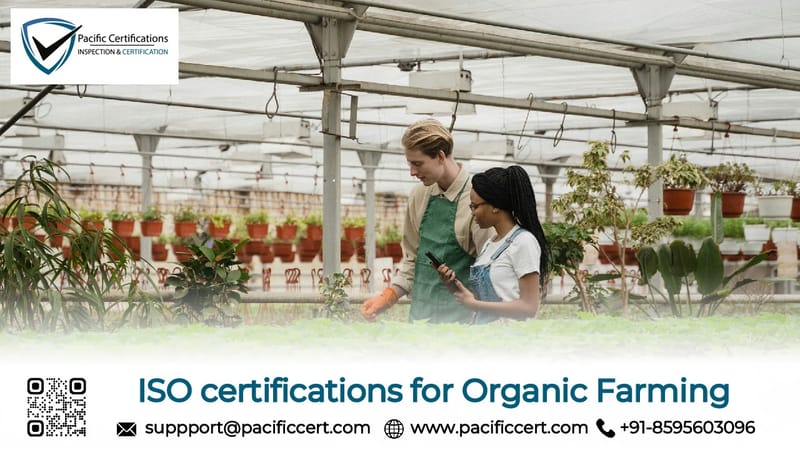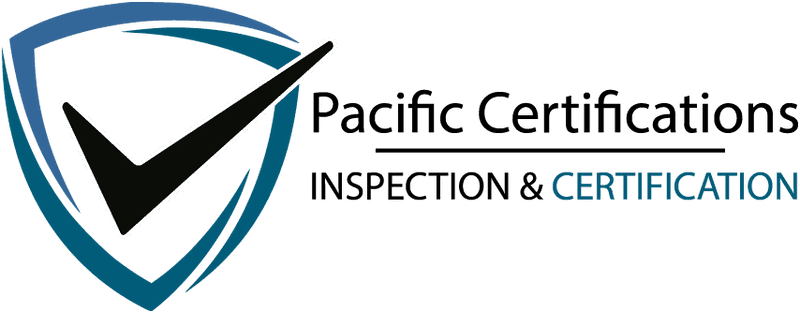ISO Certifications for Organic Farming, Requirements and Benefits

Introduction
Organic farming operates in a quality-sensitive, compliance-driven, and sustainability-focused environment where soil health, crop integrity, food safety, environmental stewardship, traceability, and consumer trust are critical. Organic farmers and agribusinesses manage complex activities including land preparation, seed sourcing, crop cultivation, pest and disease control, irrigation, harvesting, storage, processing coordination, and supply chain interactions, often under strict regulatory and certification oversight.
As global demand for organic food continues to rise, expectations on organic farming operations have expanded beyond traditional practices to include documented management systems, measurable environmental performance, food safety controls, and traceability across the value chain. Buyers, exporters, retailers, and regulators increasingly require objective evidence of controlled farming practices and risk management.
ISO certifications provide organic farming organizations with internationally recognized frameworks to demonstrate consistent agricultural practices, environmental responsibility, food safety, worker safety, and operational reliability, supporting both domestic and export markets.
In organic farming, trust grows not only from the soil, but from the systems that protect integrity at every stage of production.
Quick Summary
ISO certifications provide organic farming enterprises with globally accepted frameworks to manage quality through ISO 9001, environmental stewardship through ISO 14001, food safety through ISO 22000, occupational health and safety through ISO 45001, water and energy efficiency through ISO 50001, supply chain traceability through ISO 22005, and risk governance through ISO 31000. These certifications help organic farms demonstrate transparency, sustainability, and compliance while strengthening confidence among regulators, buyers, and consumers.
For more information on how we can assist your organic farming business with ISO certifications, contact us at [email protected]
Applicable ISO Standards for Organic Farming
Below are the most relevant ISO standards applicable to organic farms, producer groups, cooperatives, and agri-businesses involved in organic crop production:
ISO 9001: Quality Management Systems
ISO 9001 provides a structured framework for managing organic farming processes such as crop planning, input control, field operations, harvesting, storage, and supplier coordination. It helps farms ensure consistency in practices and continuous improvement across seasons and locations.
ISO 14001: Environmental Management Systems
Environmental protection is central to organic farming. ISO 14001 supports systematic management of soil conservation, water usage, waste handling, biodiversity protection, and compliance with environmental regulations and organic principles.
ISO 22000: Food Safety Management Systems
ISO 22000 is critical for organic farms supplying fresh produce, grains, or raw agricultural inputs into food supply chains. It ensures food safety hazards are identified and controlled from primary production onward, supporting buyer and exporter requirements.
ISO 45001: Occupational Health and Safety Management Systems
Organic farming involves manual labour, machinery operation, chemical-free pest control substances, and field work under varying conditions. ISO 45001 helps protect farm workers by managing occupational health and safety risks.
Click here to find out more applicable standards to your industry
Contact us today to start your certification journey!
What are the Requirements of ISO Certifications for Organic Farming?
Organic farming organizations seeking ISO certification must establish and maintain documented policies, procedures, and records aligned with the selected ISO standards. Key requirements include the following:
ISO 9001:2015 – Quality Management Systems
Defined farming procedures for land preparation, planting, cultivation, and harvesting
Control of organic inputs such as seeds, compost, and biological treatments
Monitoring of crop performance and yield consistency
Supplier and contractor evaluation
Control of non-conforming produce
Record-keeping and traceability
Internal audits and management reviews
ISO 14001:2015 – Environmental Management Systems
Identification of environmental aspects such as soil health, water use, and waste
Compliance with environmental and organic farming regulations
Soil conservation and erosion control measures
Water management and irrigation controls
Waste management and composting procedures
Environmental objectives and monitoring
ISO 22000:2018 – Food Safety Management Systems
Identification of food safety hazards at the farm level
Hygiene and sanitation controls during harvesting and storage
Control of contamination risks
Traceability and recall readiness
Record-keeping and verification activities
ISO 45001:2018 – Occupational Health and Safety
Hazard identification for farm activities
Risk assessments for machinery, tools, and manual handling
Safe work procedures and training
Incident and accident reporting
Emergency preparedness
ISO 22005:2007 – Traceability Systems
Identification of lots, fields, and batches
Documentation linking inputs, production, and outputs
Record-keeping supporting farm-to-market traceability
Tip:Start by mapping one complete crop cycle—from land preparation and planting to harvesting, storage, and dispatch—against ISO requirements to identify quality, environmental, and food safety gaps early.
For further information on how we can assist your organic farming operations with ISO certifications, contact [email protected]
What are the Benefits of ISO Certifications for Organic Farming?
ISO certifications are suitable for individual organic farms, farmer producer organizations, cooperatives, and export-oriented agri-businesses. Key benefits include:
More consistent organic farming practices across seasons
Improved soil, water, and environmental performance
Enhanced food safety and traceability
Safer working conditions for farm labour
Increased credibility with buyers and exporters
Better risk preparedness for climate and supply disruptions
The global organic food and farming market continues to expand rapidly. Industry projections indicate that the global organic market is expected to exceed USD 600 billion by 2030, driven by rising consumer demand for clean-label food, sustainability awareness, and stricter environmental regulations. Organic farmland area worldwide is also projected to grow steadily as governments support regenerative and low-impact agriculture.
Climate variability and supply chain volatility are increasing operational risks for farms. Studies show that farms adopting structured quality, environmental, and food safety management systems achieve 20–35% reductions in post-harvest losses, improved compliance, and stronger buyer confidence.
How Pacific Certifications Can Help
Pacific Certifications, accredited by ABIS,, acts as an independent certification body for organic farming organizations by conducting impartial audits against applicable ISO standards. Our role is to objectively assess whether documented management systems and farming operations conform to international ISO requirements, based strictly on verifiable evidence.
We support organic farming enterprises through:
Independent certification audits conducted in accordance with ISO/IEC 17021
Objective assessment of farming practices, records, and traceability systems
Clear audit reporting reflecting conformity status and certification decisions
Issuance of internationally recognized ISO certificates upon successful compliance
Surveillance and recertification audits to maintain certification validity
If you need support with ISO certification for your organic farming operations, contact [email protected]or +91-8595603096.
Author: Sony
Read More at: Blogs by Pacific Certifications

